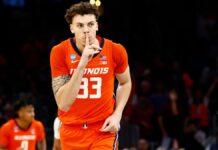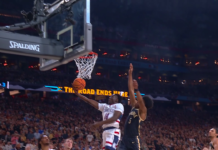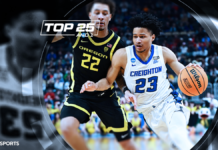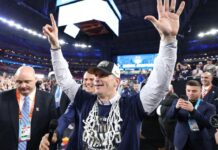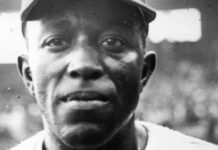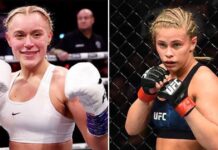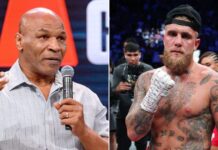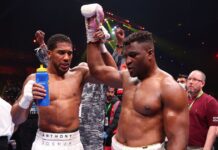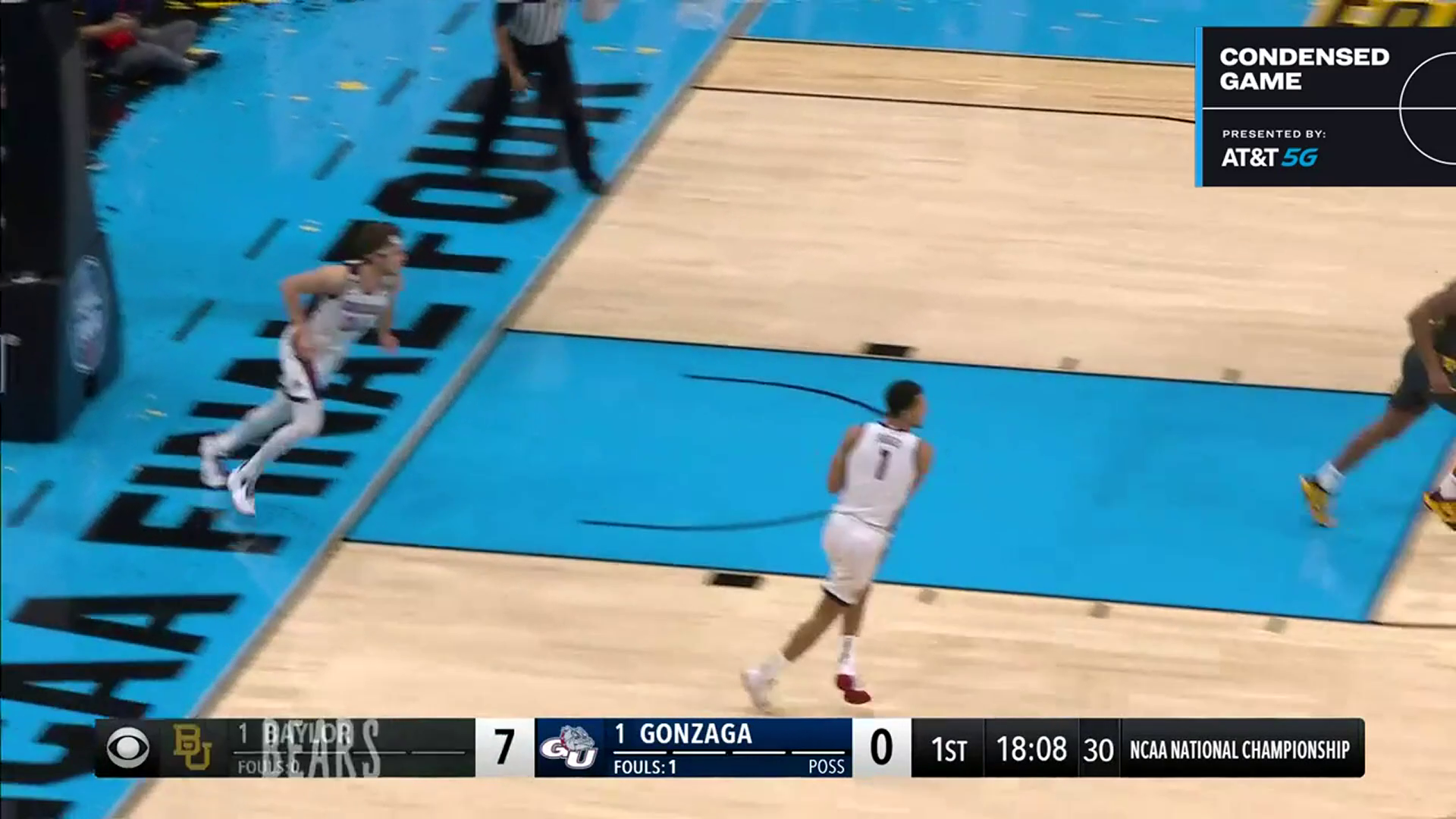INDIANAPOLIS — All the pieces were there. The testing, the isolation, the sacrifice, all of it could lead to the type of perfection that had not taken place in a college basketball season in 45 years. The Gonzaga Bulldogs reached the national championship game, the first team to do it with a perfect record since Larry Bird’s Indiana State squad in 1979, with a chance to become the first undefeated champion since the 1976 Indiana Hoosiers.
Two gifted undefeated teams from tournaments in the last 30 years — 1991 UNLV and the 2015 Kentucky Wildcats — had been stopped one step short of a championship night. Jalen Suggs, Gonzaga’s star freshman, had hit the unforgettable, 37-foot buzzer beater to beat UCLA in overtime and propel the Bulldogs into the championship game.
Gonzaga had a shining moment. But not “One Shining Moment.”
For when perfection was about to become part of history, the relentless aggressiveness of the Baylor Bears wrecked Gonzaga’s championship hopes. Baylor’s 86-70 victory, an overwhelming effort from the opening seconds, gave the Bears their first national championship and denied the Bulldogs their first title.
“That’s how you have to play the game,” said Gonzaga senior Corey Kispert, who was held to 12 points, nearly seven beneath his average. “Especially in this kind of a place, in this environment, the more aggressive team gets more calls. The more aggressive team makes more 3s. The more aggressive team gets more rebounds.
FINAL FOUR: Most outstanding players from 1939 to now
“And they punched us in the mouth right at the get-go,” Kispert said. “And it took a long, long time for us to recover and start playing them even again. But then it was too late.”
The Bulldogs became the third team in this history of the tournament to lose its perfect record in the national championship game. Larry Bird’s Indiana State lost 75-64 to Magic Johnson’s Michigan State in 1979. Ohio State lost to Cincinnati 70-65 in overtime in 1961.
The Zags are also the third team to have an undefeated Final Four run end in Indianapolis, after Wisconsin defeated Kentucky in 2015 and UNLV lost to Duke in 1991.
Baylor was simply more tenacious than Gonzaga. Baylor came into the game a team that forced 17 turnovers a game and grabbed 12 offensive rebounds per game, and both factors played a huge role in how the game was determined. By the 7:50 mark of the first half, Baylor had grabbed seven offensive rebounds and had forced Gonzaga into seven turnovers; for the game the Bears grabbed 16 offensive rebounds and forced Gonzaga into 14 turnovers.
It was clear that Baylor’s elite defenders were making it difficult for Gonzaga to get anything going, and Gonzaga’s stars aside from Suggs were not making any sort of appreciable difference. Drew Timme, Gonzaga’s leading scorer through the tournament, was taken out of the game on both ends. Timme was turning the ball over frequently, usually by dribbling into space, then being crowded in the paint and getting the ball poked away by one of Baylor’s many pests. Three of Timme’s five turnovers resulted in three steals for the Bears, and Baylor spent the game converting on those opportunities, finishing with 19 points off Gonzaga turnovers. He also only finished with seven shots for the game and had his first sub 20-point total for the tournament.
Baylor coach Scott Drew described the importance of getting Timme out of his game. “Tonight, we forced him into five turnovers and limited him to 12 points,” Drew said. “He’s a heck of a player. And we knew we just couldn’t let him get the ball because if he got the ball it was a problem for us. Credit our guys for really having great ball pressure on the perimeter and really trying to limit his touches, because if he caught it we knew we were going to be in trouble.”
Baylor was never in trouble. The Bears led for 39:27. The game was tied for 33 seconds.
At the offensive end, the Bears were putting Timme in pick-and-roll situations, and when Timme would come to guard the Baylor guard handling at the 3-point line, there would often be a guard, usually Suggs or Andrew Nembhard, on one of Baylor’s bigs. This was the source of many Baylor points in the paint and second chance points, as it seemed Timme was struggling to contain the Baylor guards.
Offensive rebounding was huge for the Bears. Of the 38 total rebounds for Baylor, 16 came on the offensive boards. Senior Mark Vital, who had eight of his 11 rebounds on the offensive boards, became the fourth player since 2000 to have at least eight offensive rebounds in a championship game, joining Roger Powell of Illinois, Nick Collison of Kansas and Jeff Graves of Kansas.
Vital had three offensive rebounds less than 90 seconds into the game, and Baylor was up 4-0 just 1:25 into the first half. “They’re obviously more athletic than we are up around the rim,” said Gonzaga coach Mark Few. “But I thought we might be able to find some advantages, too, and we just weren’t quite able to do that.”
Kispert was held in check by the Baylor defenders, as he shot 2 for 7 from 3-point range, when he normally shoots 45 percent from distance. Kispert was able to get to 12 points, but it was clear without his shooting the Bulldogs were not able to generate the necessary spacing to get anything going. The Baylor defense always seemed to be in the right position, and the aggressiveness of the Bears became a decisive factor on a championship night.
March Madness: Baylor dominates to win first-ever D1 men’s title
Suggs was more productive in the second half, scoring 15 of his 22 points in a desperate attempt to get any offense going. After Gonzaga was able to cut its deficit to nine at 58-49, Baylor went on a 15-4 run to make it 73-53, and for the rest of the game Gonzaga never got closer than 13. The Bulldogs switched to zone, and Few described the result. “They hit back-to-back 3s on it,” Few said. “So they scored six straight points. And then tried it one more time and they got either a high-post jumper or a guy caught it in the middle of the zone and bounced down. So they scored eight quick points against it.”
Few said that he’s thankful for everything his team went through, and that he loved the team’s heart and competitiveness. “I just marvel at everything they had to deal with this year,” he said. “I mean, our isolation, every time we were on the road and all the COVID protocols and the changes and not being able to practice and practicing and sitting out for 14 days and things like that. Yet they always just had an amazing attitude and positivity about them that’s just — you can’t thank them enough.”
Kispert said that while the last year has been challenging with COVID and the season’s lone defeat, he would not change any of it. “It’s about dealing with those painful moments in your life and finding joy in those,” he said. “And that’s where real happiness comes from. And I’m so thankful for the way that the team handled adversity and handled suffering all year long.
“And I’m definitely a better person because of playing this year under the circumstances that we did,” Kispert said, “taking punch after punch, I guess, from the world. And this team stayed strong all the way through.”






















